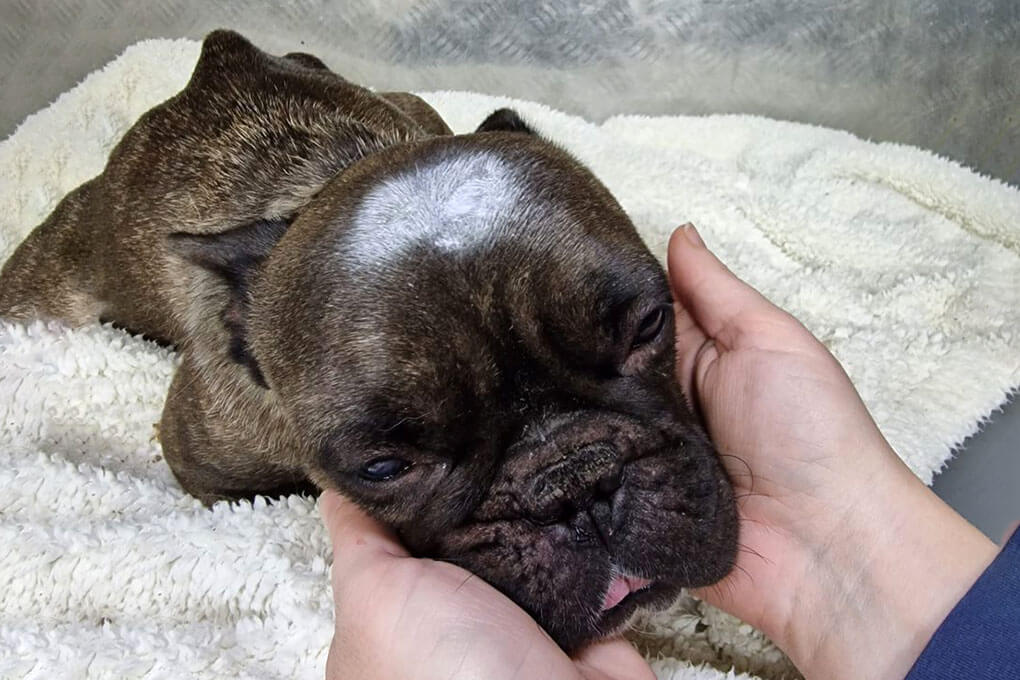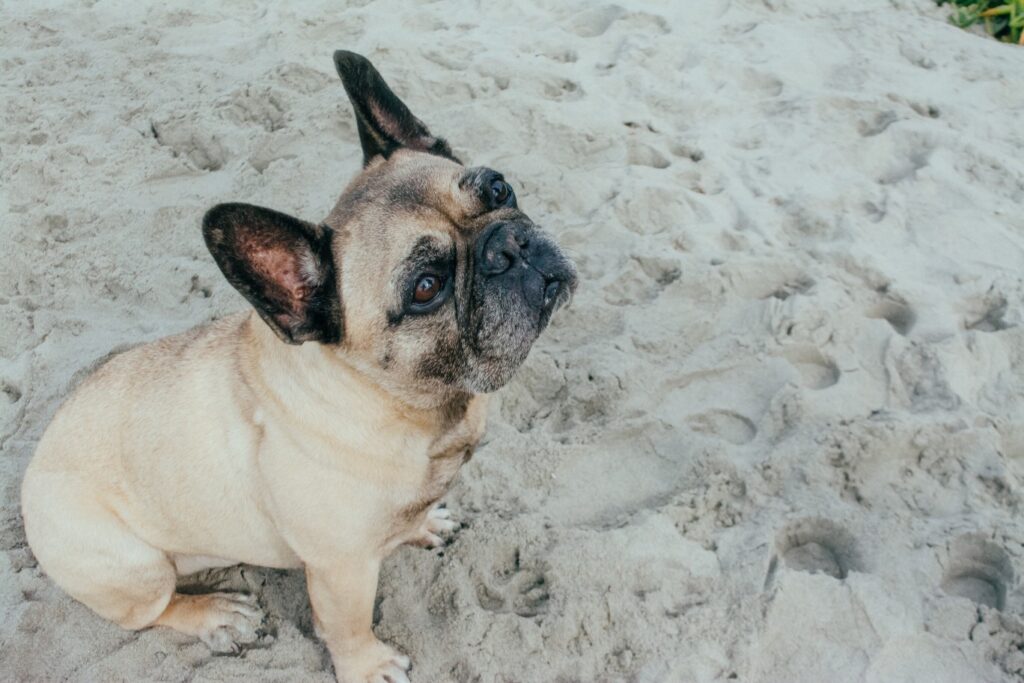Seizures in French bulldogs are probably one of the most terrifying occurrences you could witness. They can occur due to several reasons, such as genetic predispositions, poisoning, and diabetes. So, if your Frenchie is dealing with repeating seizures, here is what you need to know.
What are the main reasons for seizures in French bulldogs?
Seizures in Frenchies can be pretty distressing, significantly, because many reasons can trigger them! In most cases, a seizure will consist of three phases. You could see your bulldog acting unusually in the preictal phase or the onset. It might feel restless, anxious, or behave oddly.
Then, the ictal phase kicks in. This is the actual seizing period, often the most dramatic. Your pup might collapse, show erratic movements, or even lose consciousness. The last phase is the postictal phase, where your bulldog might seem disoriented or confused but eventually return to normal behavior.
Besides idiopathic French Bulldog epilepsy, which is an inherited disorder and includes repeating seizure episodes, other reasons for seizures in Frenchies include the following:
- Diabetes
- Food poisoning
- Head injuries
- Rabies
- Canine distemper virus
- Liver disease
- Brain tumor
- Anemia
- Kidney disease
- Encephalitis
- Stroke
Additionally, genetic factors and environmental triggers such as diet can also lead to seizures. Primary epilepsy, which develops without a known cause, typically affects dogs between 6 months and five years of age. Secondary epilepsy, often related to congenital factors or health issues like liver shunt, hepatitis, or meningitis, can affect dogs outside this age range.
Regular check-ups and a seizure diary are essential in managing your pet’s condition. Discuss breeding considerations with your veterinarian if your Frenchie has a history of seizures, as genetics can play a significant role.
How do we recognize seizures in French bulldogs?
Seizures in your French bulldog can easily be spotted and consist of three components.
The first stage of a seizure in a French bulldog
The first stage, aura or pre-ictal phase, includes strange body language and nervous or anxious behavior. The dog may start hiding, seek a safe place, or tend to stay close to its owner. This phase often goes unnoticed; most owners don’t connect it with a seizure episode.
The second stage of a seizure in a French bulldog
Otherwise called the ictal phase, this episode may last from one to several minutes. A dazed look, shaking, trembling, lip licking, drooling, and paw licking can be only some of the symptoms.
In case of loss of consciousness, the dog’s muscles will start to move spastically and erratically. It would be best if you did not try to force your dog and try to pull out its tongue. There is a wrong opinion that a dog with a seizure can choke on its tongue.
During the ictal phase, urination and defecation may occur, and the seizure may last up to several minutes. If it lasts over five minutes, the dog is said to be in the status epilepticus.
The third stage of a seizure in a French bulldog
In the last stage, a Frenchie may seem disoriented and tired and start breathing fast. Salivation, pacing, and temporary blindness can also occur, so it’s important to gently pet your dog, tell him/her praise words, and try to calm him/her down.
Are Seizures Dangerous For My Frenchie?

- The image above is the “Frog The Frenchie” we found on the road and saved her.
Seizures can be dangerous for your French bulldog if the ’’attack’ occurs on stairs or your dog could fall elsewhere. Therefore, we suggest you remove knocking objects from the area where your pet spends most of its time.
Treatment Options for French Bulldogs that Experience Seizures
When your French Bulldog is experiencing seizures, it’s vitally important to seek the advice of your trusted vet. Together, you’ll explore different treatment options depending on the severity and frequency of seizures.
Medication Therapy
First on our list is medication therapy, which is often the primary line of defense against seizures in French Bulldogs. Commonly used medications include diazepam, clonazepam, phenobarbital, and potassium bromide. These are typically employed as needed or sometimes integrated into a long-term treatment strategy.
It’s crucial to remember that medications come with potential side effects. They should thus be handled and administered with care. As pet owners, it’s our responsibility to ensure these pharmaceuticals are kept out of their reach when not in use.
Dietary Changes and Supplementation To Prevent seizures for Frenchie
Next, let’s discuss dietary adjustments and Frenchie’s supplementation. French Bulldogs should ideally consume about 25-30 calories per pound. Dividing these calories into two to three meals daily can benefit their overall health.
A balanced nutrition plan may play a significant role in managing seizure episodes. Certain foods, when eliminated from a dog’s diet, may help reduce the occurrence of seizures. Conversely, certain supplements or dietary changes may be beneficial for dogs that experience seizures. It’s essential to consult with your veterinarian on these matters to tailor a diet that suits your Bulldog’s specific needs.
Surgery in Extreme Cases
Lastly, surgery may be considered in extreme cases. For instance, if diagnostic tests reveal a mass or tumor contributing to the seizures, a craniotomy (surgery to remove the mass) could be recommended to stop the seizures. Surgery is typically considered a last resort and only pursued if other treatment options have proven ineffective.
Regardless of the treatment route chosen, remember that avoiding high-stress environments and situations for your Bulldog is critical. These factors can trigger seizures and should thus be kept at bay to manage the dog’s seizures effectively.
How do I recognize when to seek professional help for my French Bulldog’s seizures?

Seek veterinary care if seizures become unusually long or frequent if your dog loses consciousness, shows unusual behavior after seizures, has difficulty breathing, drools, or twitches during episodes, changes appetite, experiences weight gain/loss, lethargy, or demonstrates personality changes.
What should I avoid feeding my doggo to prevent seizures?
Foods such as chocolate, caffeine/coffee, alcohol, xylitol, salty foods, and sago palm can trigger seizures in dogs and should thus be avoided.
What should you do if your Frenchie is having a seizure?
- As we already mentioned, it’s essential not to try to pull out the dog’s tongue during the seizure. Otherwise, your Frenchie might bite you, and you could hurt him simultaneously.
- No matter how terrifying your dog looks during the attack, you should know he/she is not conscious or in pain. Stay calm because it’s the only way to help your Frenchie.
- If the seizure lasts over 3 minutes, there is a risk of getting into hyperthermia. In such situations, we recommend you put a wet towel over your Frenchie’s body. You should use cool and not ice-cold water to reduce your dog’s body temperature.
- We recommend you consult your veterinarian even when your pup seems normal after the seizure.
- Make notes about the seizure you saw. How long did it last?
- If your dog had more than one seizure episode during the 24 hours, you should take it to the vet as soon as possible.
What should I do after my French Bulldog has a seizure?
Once your dog regains consciousness and can stand without wobbling, give it something to eat or drink. Your dog may be extremely tired post-seizure, so allow it to sleep as needed.
Conclusion
Understanding seizures in French Bulldogs is crucial for every pet owner. Awareness of triggers and early detection can significantly improve your furry friend’s quality of life. Monitoring their diet, exercising regularly, and scheduling routine vet visits is vital. Always be alert for signs that it’s time to seek professional help – changes in behavior, appetite, or weight can indicate a problem.
Remember, while idiopathic epilepsy is a common cause, toxins, head trauma, and metabolic disorders can also lead to seizures. Consult your vet for the best treatment approach, from medication to dietary changes and surgery in extreme cases. In essence, proactive management and prompt treatment are vital in ensuring the well-being of your French Bulldog.




